
When we unite passionate individuals under a common goal, the potential for positive change is endless. This is the powerful truth that the Spring 2024 cohort of our Let’s SOLVE it program has brought to life.
Let’s SOLVE it is an eight-week mentorship journey that immerses students in the world of Artificial Intelligence (AI) and Machine Learning (ML). Under the guidance of our RBC Borealis researchers and engineers, each project team embarks on a mission to tackle real-world issues that resonate with them personally. It is a hands-on experience that goes beyond the classroom, empowering students to apply their knowledge in meaningful ways.
From revolutionizing homelessness support services to optimizing energy consumption, from bridging communication gaps with sign language translation to pioneering sustainable agriculture practices, these young innovators are redefining what is possible.
Dive into our blog post to explore how this year’s cohort took action in creating AI solutions that have the potential to make a real difference in our communities.
Meet the Teams

Team: Compassionate Coders
Members
Emily Nguyen, India Tory, Nida Copty, Tom Nguyen
University of Toronto
Mentors
Wasim Ismail, Senior Data Engineer, RBC Borealis
Peter Casey, Director of Strategy, California Policy Lab, University of California
Problem they wanted to solve
Optimizing Homeless Shelter Operations in Toronto. “In Toronto, over 9000 people are homeless each night due to various factors like family violence, mental illness, and job loss.” [1] Recently, there has been unprecedented pressure on the shelter system due to the increased cost of living and lack of affordable housing. Homelessness support services in Toronto encounter difficulties in forecasting the demand for shelter beds, resources, and staff.
Let’s SOLVE it
The team built a machine learning model to predict the demand for shelter beds and resources within Toronto’s homeless support services.
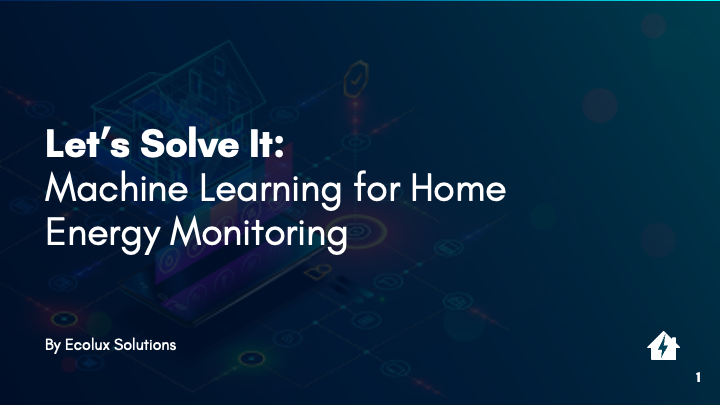
Team: Ecolux Solutions
Members
Nicholas Stranges, Katie Stevens, Thomas Michalski, Lauren Rejano
University of Western Ontario
Mentor
Mayank Anand, Data Engineer II, RBC Borealis
Problem they wanted to solve
Power & Energy Tracker. “19% of Canadian households experience Utility Poverty.” ” [2] For these Canadians, utility bills are a significant burden on their monthly budgets, and they lack practical tools to manage energy consumption and reduce costs.
Let’s SOLVE it
The team built and app that tracks users’ live energy usage and offer actionable insights to help them reduce it.
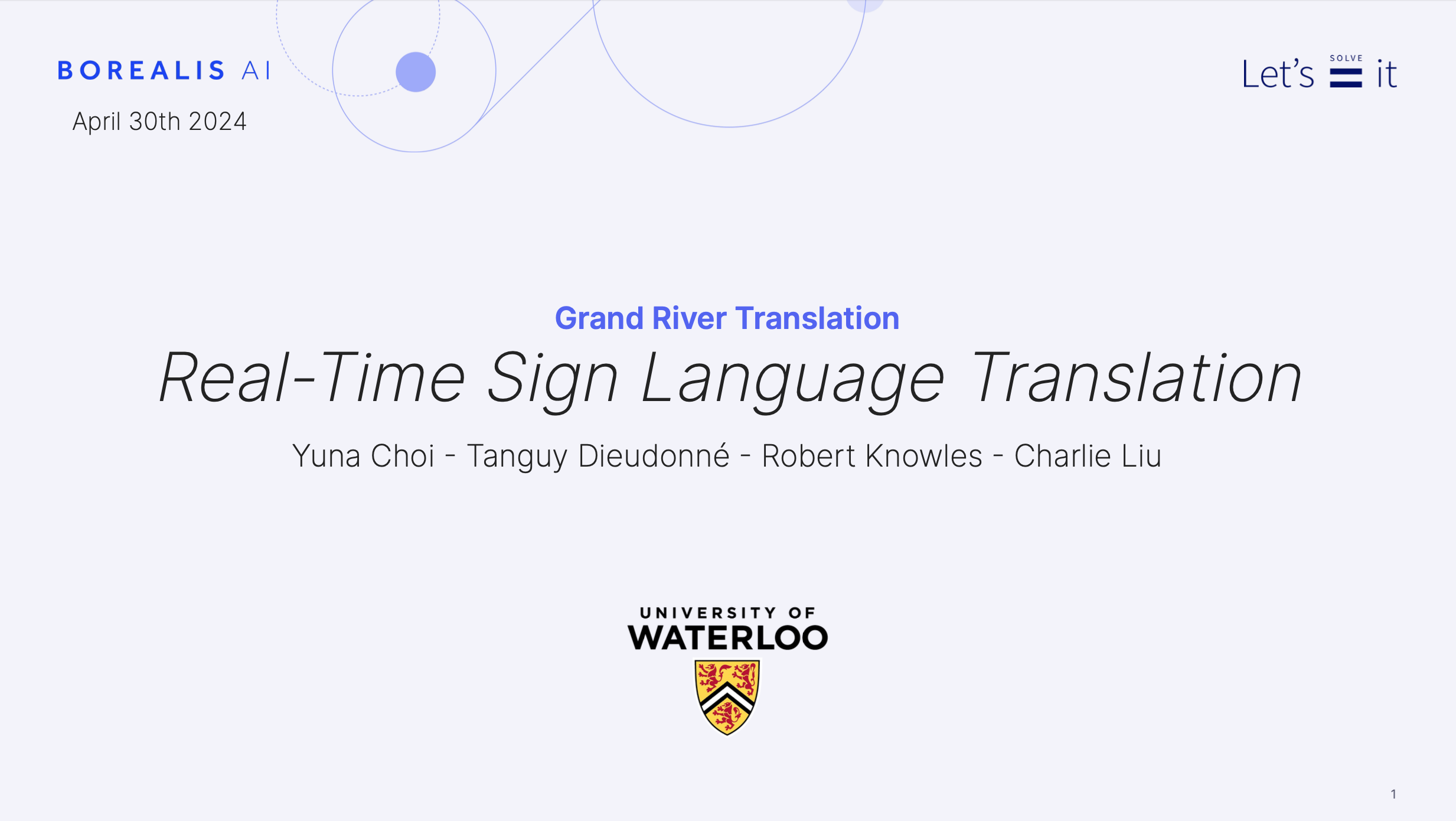
Team: Grand River Translation
Members
Charlie Liu, Tanguy Dieudonné, Yuna Choi, Robbie Knowles
University of Waterloo
Mentor
Elahe Najafabadi, Research Engineer II, RBC Borealis
Problem they wanted to solve
Real-Time Sign Language Translation. There are more than 500,000 American Sign Language (ASL) speakers in North America, but progress in sign language translation (SLT) has not reached the same level of sophistication as translation for other spoken languages.
Let’s SOLVE it
The team built a real-time application that, given a live signer, translates their signs to English text.
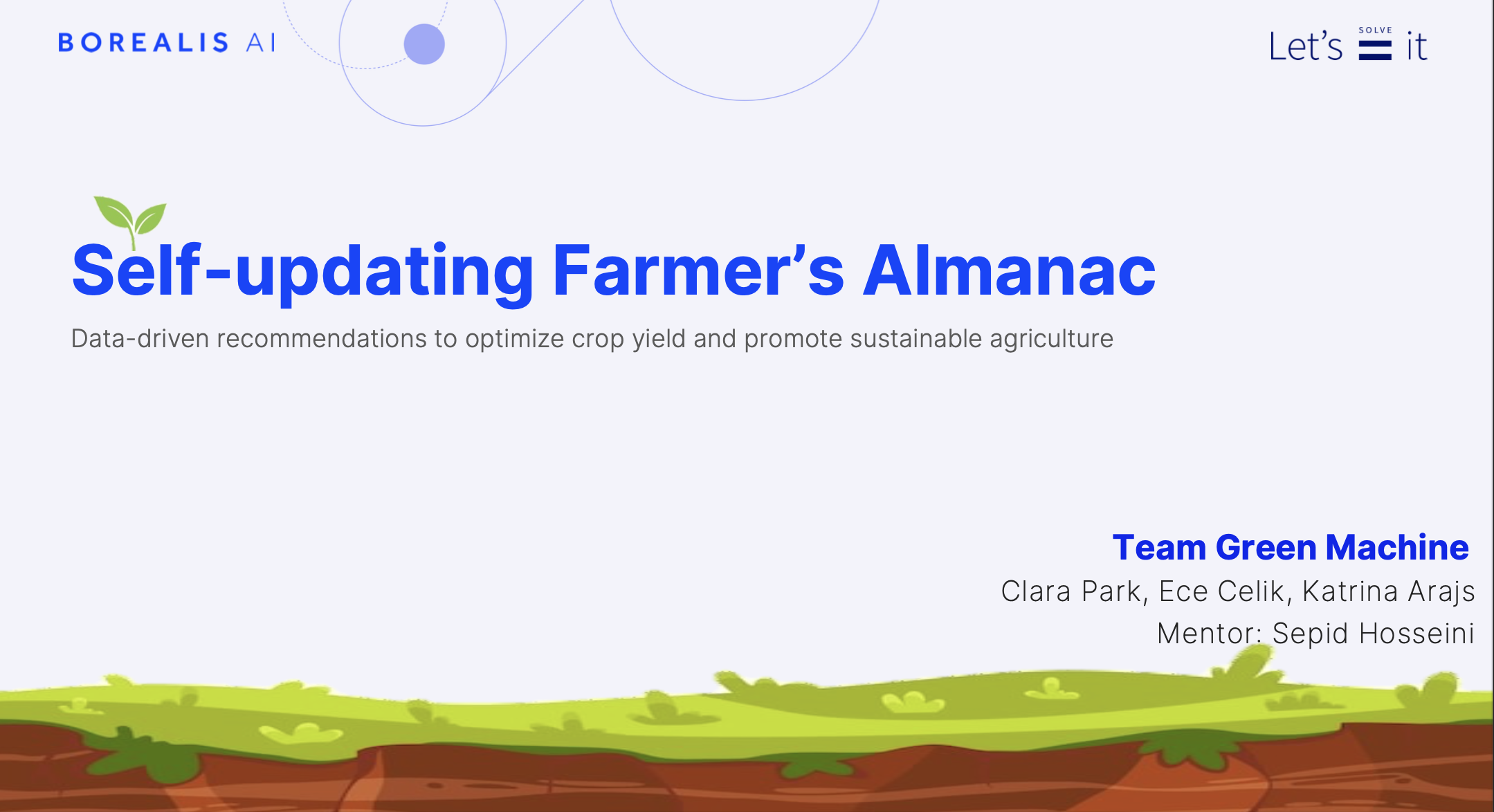
Team: Green Machine
Members
Clara Parks, Katrina Arajas, Ece Celik

University of British Columbia
Mentor
Sepid Hosseini, Machine Learning Researcher, RBC Borealis
Problem they wanted to solve
Self-updated Farmer’s Almanac. Assist farmers in making informed decisions to maximize crop yield while promoting resource efficiency.
Let’s SOLVE it
The team developed an AI system capable of recommending crop types using agroclimate and soil data, incorporating predictions for future weather changes to enhance the system’s adaptability to shifting climatic conditions.
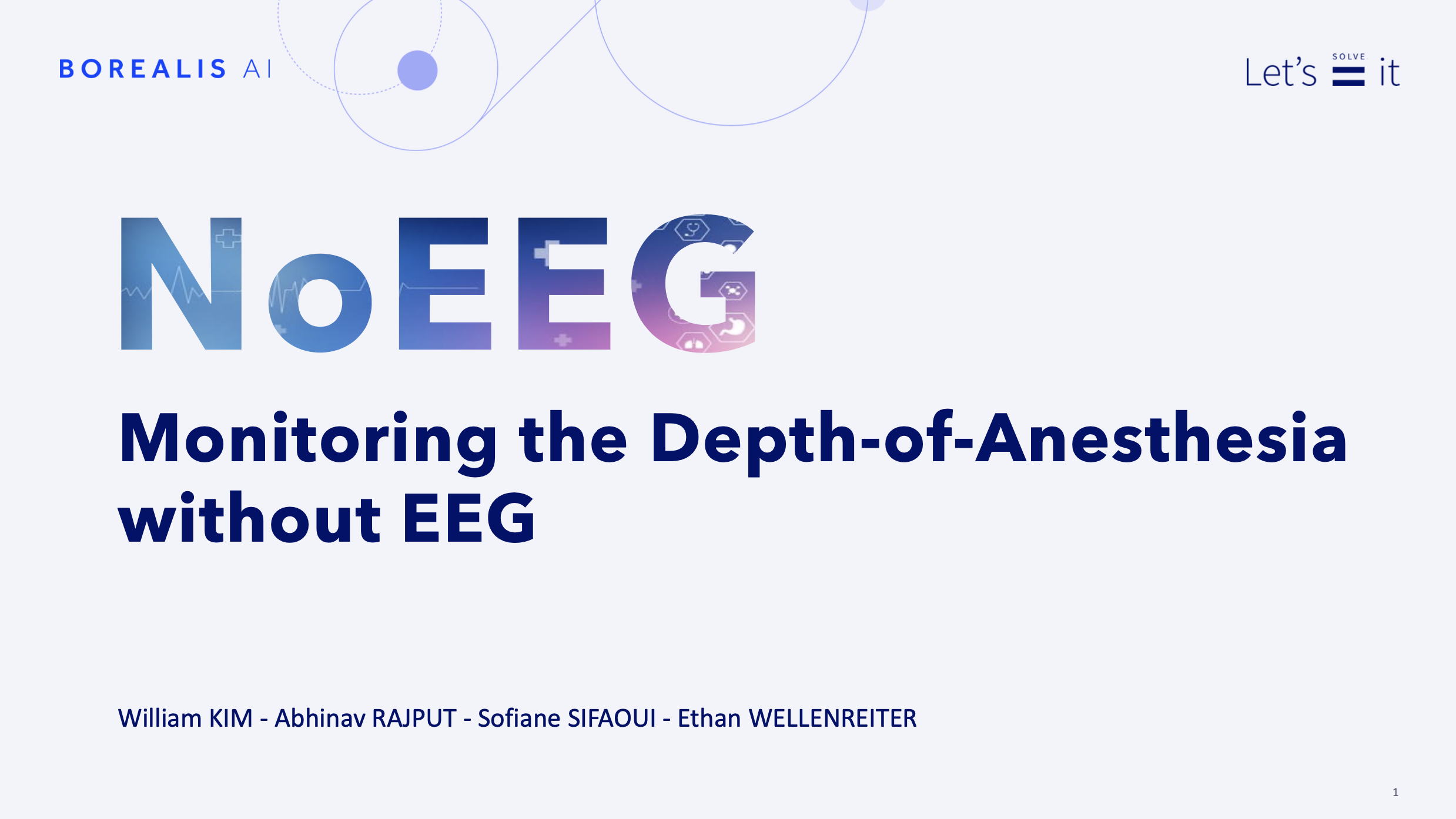
Team: NoEEG
Members
Sofiane Sifaoui, Abhinav Rajput, Ethan Wellenreiter, William Kim
University of Waterloo
Mentors
Vin Bhaskara, Research Engineer II, RBC Borealis
Philip Mathew MD, Clinical Expert
Problem they wanted to solve
Monitoring the Depth-of-Anesthesia Without EEG. Not all operating rooms in the world are equipped with EEG sensors to monitor the Depth-of-Anesthesia or a patient during a surgical or medial procedure.
Let’s SOLVE it
The team developed a model that predicts BIS scores using only physiologic and clinical signals, without EEG data.
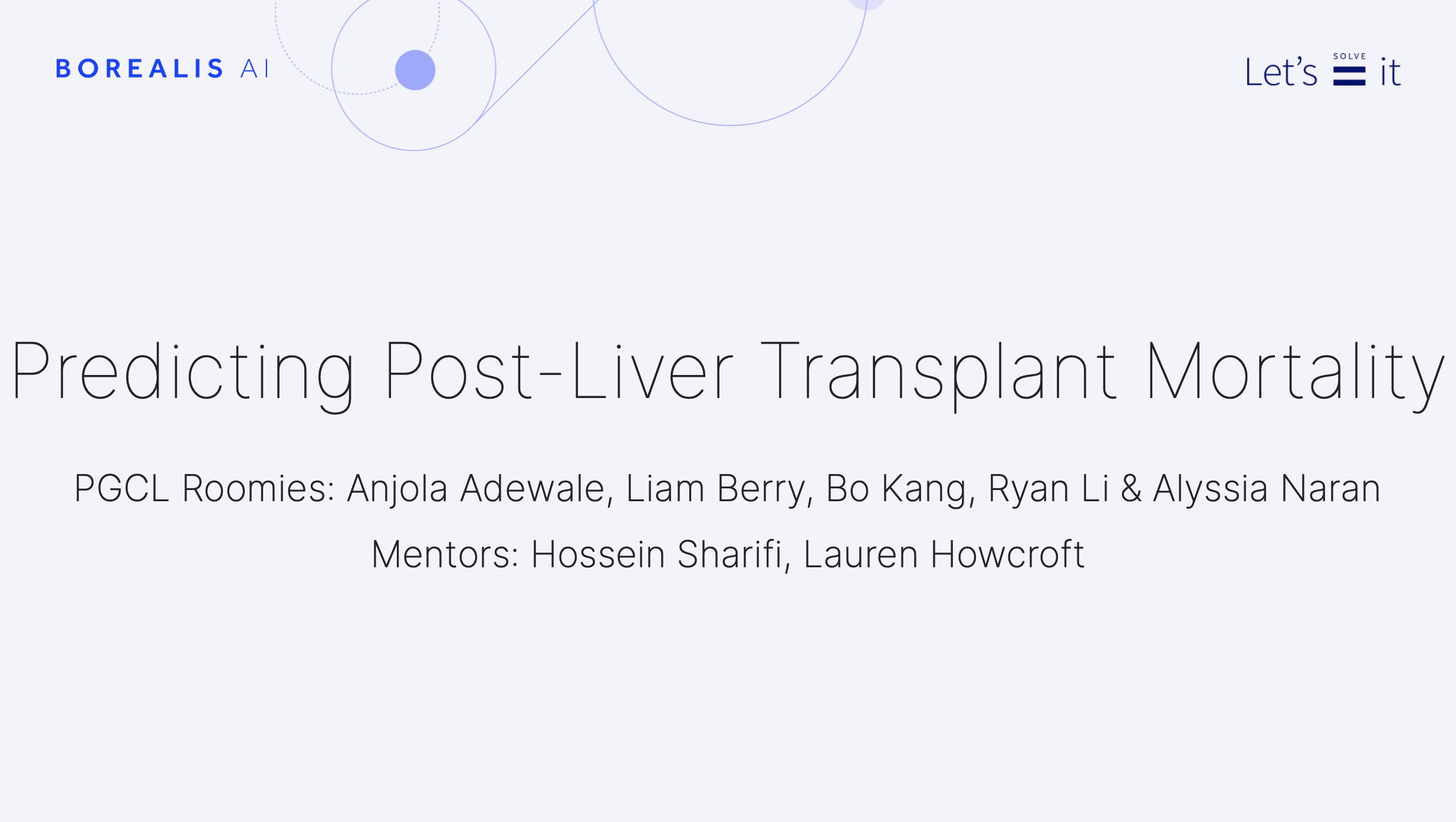
Team: PGCL Roomies
Members
Liam Berry, Ryan Li, Bo Kang, Alyssia Naran, Anjola Adewale

McMaster University
Mentors
Hossein Sharifi, Machine Learning Researcher II, RBC Borealis
Lauren Howcroft, Senior Manager, Payments and Digital Commerce Strategy, Payments Strategy
Problem they wanted to solve
Changing liver transplantation. Despite advancements in medical practices, post-transplant mortality remains a significant issue that needs addressing to improve patient outcomes and optimize liver transplant prioritization.
Let’s SOLVE it
The team created a machine learning model that could predict post-transplant mortality to help in the decision-making process for liver transplant prioritization and improve overall patient management post-surgery.

Team: RadioCare
Members
Adibvafa Fallahpour, Archita Srivastava, Mantaj Dhillon, Grace Liu
University of Toronto
Simon Fraser University
Mentors
Samuel Haruna, Technical Product Manager, RBC Borealis
Philip Mathew MD, Clinical Expert
Problem they wanted to solve
Radiology Report Generation. The medical imaging process heavily relies on manual examination. Human interpretation leads to delays and inconsistencies due to factors like fatigue or varying expertise levels.
Let’s SOLVE it
The team built a system that generates detailed radiology reports and accurately identifies diseases and problems in a patient.
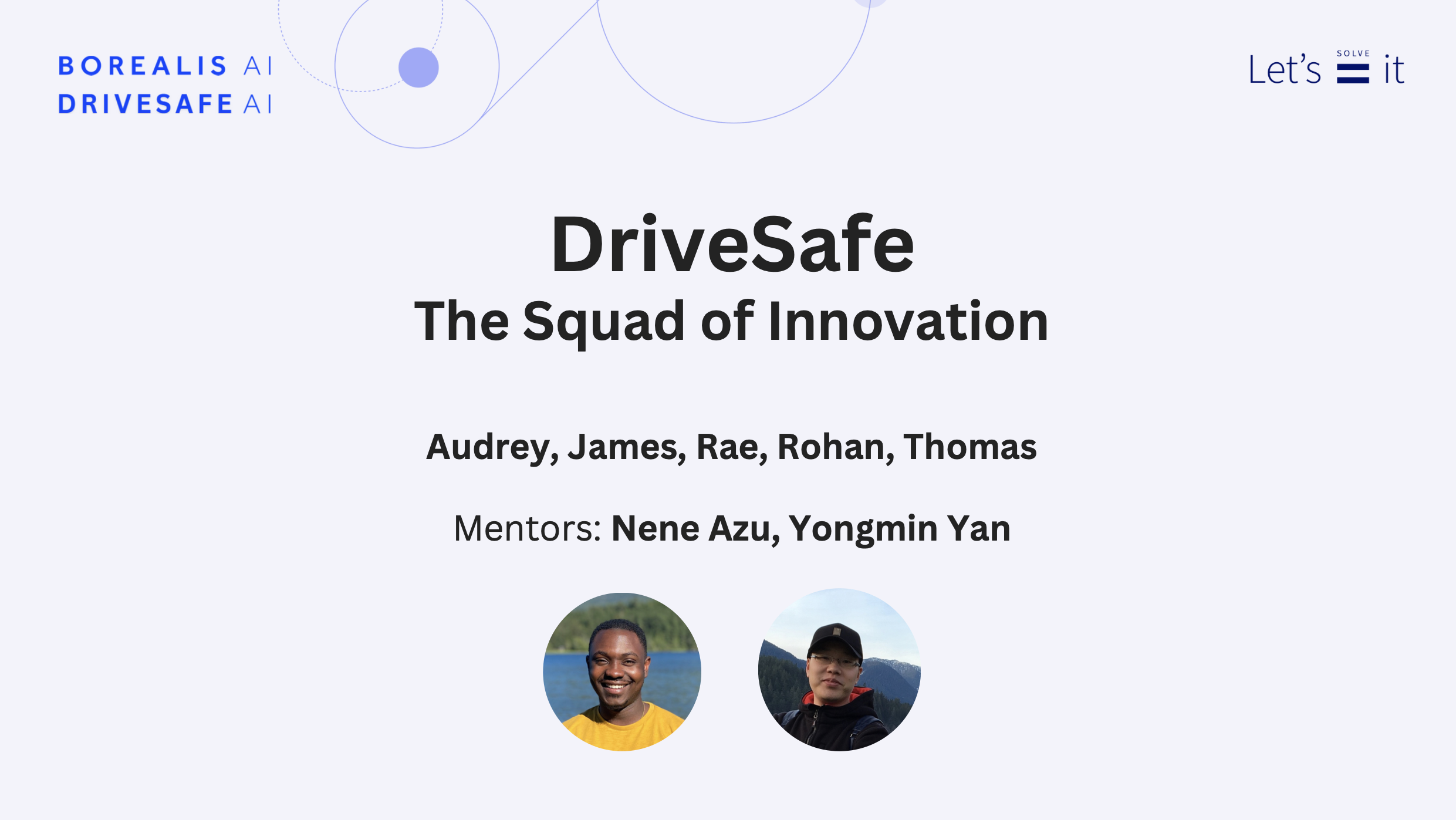
Team: Squad of Innovation
Members
Rae Shi, Rohan Sreelesh, James Yep, Audrey Lun, Thomas Nolasque
Carleton University
Mentors
Nene Azu, Senior Product Manager, RBC Borealis
Yongmin Yan, Senior Machine Learning Software Engineer, RBC Borealis
Problem they want to solve
Drive Safe. Road crashes are a significant safety and health problem in Canada and worldwide. Some drivers possess numerous unsafe driving habits, contributing to road hazards and inflating insurance costs for safer drivers.
Let’s SOLVE it
The team built a program that analyzes driving habits such as running stop signs, tailgating, lane weaving and high-speed overtaking, and applies a score that reflects these behaviours.
About Let’s SOLVE it
Let’s SOLVE it is one of a handful of initiatives that RBC Borealis and RBC support to encourage diversity, skills development, and innovation in Machine Learning (ML) at Canadian universities. Along with initiatives like our RBC Borealis Fellowships program (aimed at Ph.D. students) and our ML Research Internships program (focused on post-grad-level students), our goal is to help nurture the AI leaders of tomorrow.